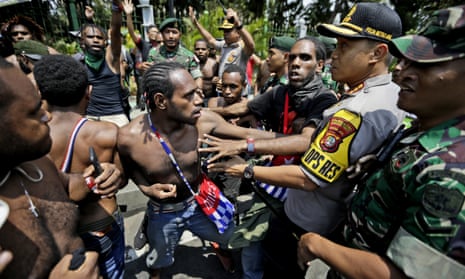Indonesia’s president, Joko Widodo, has said West Papua “has returned to normal” after clashes with police, a claim dismissed by independence protesters who said mass rallies were likely to continue.
There have been protests across the archipelago, including in Jakarta and Bali, as well as in the Papuan towns of Jayapura, Timika, Sarong and Fakfak, where police reportedly used tear gas and fired warning shots to clear crowds after they set fire to a market and destroyed ATMs and shops. Local media reports 45 people were arrested.
Papuan activists told Guardian Australia that despite the president’s claim protests have continued. Internet access has been cut across the region, making it difficult to monitor the unrest.
On Thursday, Widodo pledged action against racial and ethnic discrimination after racist abuse of Papuan students sparked days of violent protests in the country’s easternmost province. Indonesia responded by sending 1,000 additional security personnel to the provinces of Papua and West Papua.
Widodo said at the press conference on Thursday he had ordered the national police chief to “take stern, legal action against acts of racial and ethnic discrimination” and that cutting internet access to Papua and West Papua, was for the “common good”.
In an effort to defuse the increasingly tense situation, Widodo said he would invite public figures from the two provinces to the state palace next week, to discuss “accelerating prosperity” in the region.
The communications ministry previously said Wednesday’s action to block online access was to prevent the spread of fake news, but activists voiced concern that it would restrict the flow of information, at a time of unrest.
The demonstrations in Papua and West Papua were sparked by an incident in the Javanese city of Surabaya on the weekend, where nationalist groups goaded Papuan students with racist taunts, calling them “monkeys”, “pigs” and “dogs”. It followed the arrest of more than 40 Papuan students in a tear-gas filled raid on student accomodation, as part of an investigation into alleged damage of an Indonesian flag during the nation’s Independence Day celebrations. The students were later cleared.
Benny Wenda, the exiled leader of the West Papuan independence movement, has called for Indonesia to “listen to my people’s voice”.
“I’m calling for the Indonesian president to let my people go and give us our freedom,” he told Guardian Australia.
“Me and my people are ready to take over our country. So I say to the Indonesian president, this is the only way to solve our conflict.”
On Thursday demonstrators flew the Morning Star flag in front of Jakarta’s state palace – a highly provocative act which can bring jail penalties of more than a decade.
It came as the police in West Java were criticised for attempting to placate Papuan students with alcohol, delivering them two boxes of vodka.
Offended by the gesture, which has been criticised as perpetuating racist stereotypes of Papuans, the students quickly sent the bottles back.
The police initially denied the delivery was alcohol but the bottles were labelled 19% alcohol. Officers backtracked saying the offering was from an individual policeman and not a representative of the West Java police force as a whole.
In 2016 Human Rights Watch revealed that Indonesia’s intelligence agency had compiled secret files on Papuan figures, which outlined their perceived weaknesses as “alcohol and women”, and outlined strategies to target them as a way to thwart the independence movement.
The documents in the “Papua Action Plan”, formulated before the election of President Jokowi, targeted Papuan political activists, religious leaders and university students living outside the province.
.








